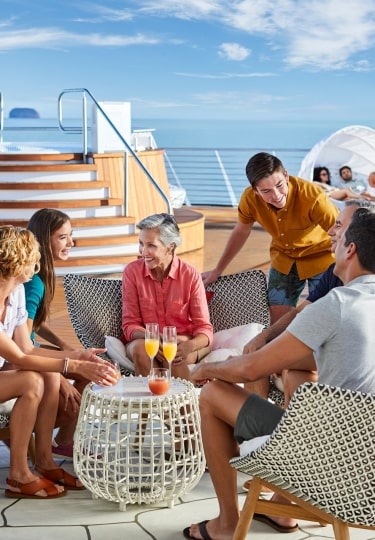How to Plan an Amazing Family Reunion Cruise
Thinking of getting the gang together for a fun-filled family reunion vacation, where strengthened family bonds and memories to last a lifetime can be made? It sure is an exciting idea to entertain—but, of course, the idea of it is a lot simpler to conjure up than is actualizing all of the complicated logistics behind such a big trip. Happily, family reunion cruises, which unfold aboard a cruise ship, might be just the ticket, as easier alternatives to planning a reunion on land.
Indeed, family reunion cruises take a lot of hassle out of reunion planning, allowing you to easily round up loved ones for a seamless, fun-for-all-ages, value-packed vacation that bundles in accommodations, meals, entertainment, and activities all in one upfront fare.
Not to mention the thrill of a family adventure vacation on the high seas that involves traveling to new ports of call along the way. And with most of those details in place (and prepaid), and tasks like cooking and cleaning delegated to the hardworking crew, you’ll have more time to kick back, relax, and reconnect with the brood—without having to worry about picking up tabs or deciding on dinner plans.

Le Petit Chef
Whether you’re planning a huge reunion with the extended family or gathering up a smaller branch or two off the family tree, cruises remain a great fit. Modern cruise ships truly offer something for everyone—even if you have three, or perhaps even four, generations of relatives along for the ride, each with their own diverse interests and tastes.
Coordinating a trip with family near and far requires some advanced cruise planning and organizational savvy, but rest assured that your goal is well within reach. This guide on planning an amazing family reunion cruise outlines every step you’ll need to accomplish so that your dream trip goes off without a hitch.
Plan Well In Advance
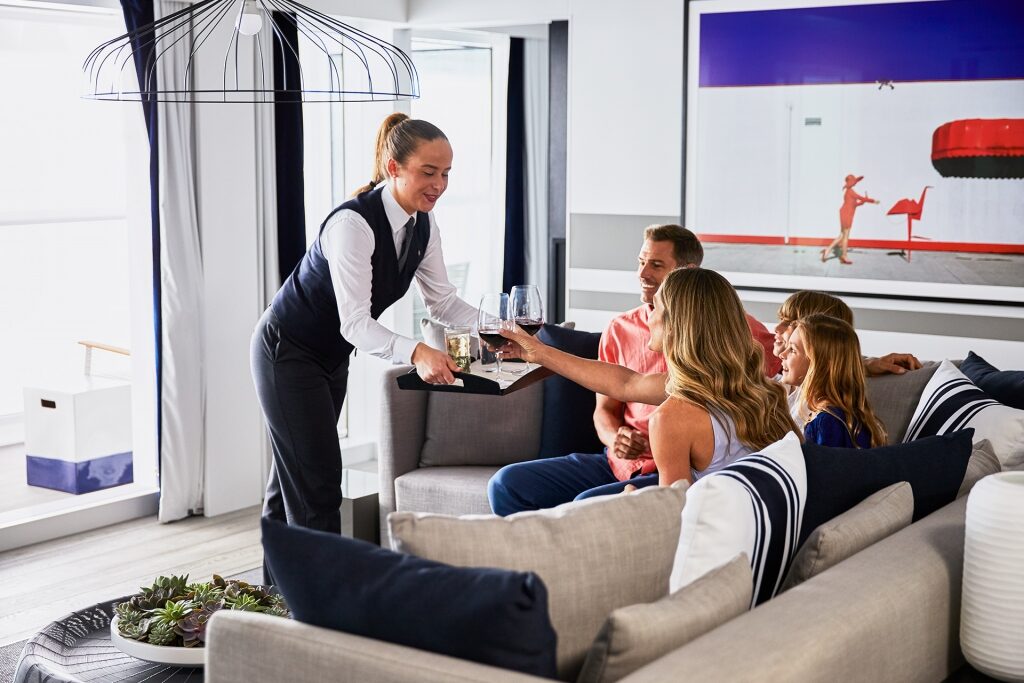
Celebrity Cruises Suite
Getting a family reunion off the ground is no small feat, so make sure to give yourself plenty of lead time to ensure smooth sailing. Aim to begin planning your family reunion cruise at least one year in advance. You’ll need a good chunk of time to figure out the confirmed guest list and group preferences (including variables like budget, cruise itinerary, and sailing dates) and to give guests ample time to budget and plan themselves.
For groups, it’s essential to know the best way to book a cruise and make your bookings as far in advance of your sailing as possible. This is to lock in early-booking discounts and group rates and to tap into your preferred stateroom locations and dining reservations.
Appoint Leadership
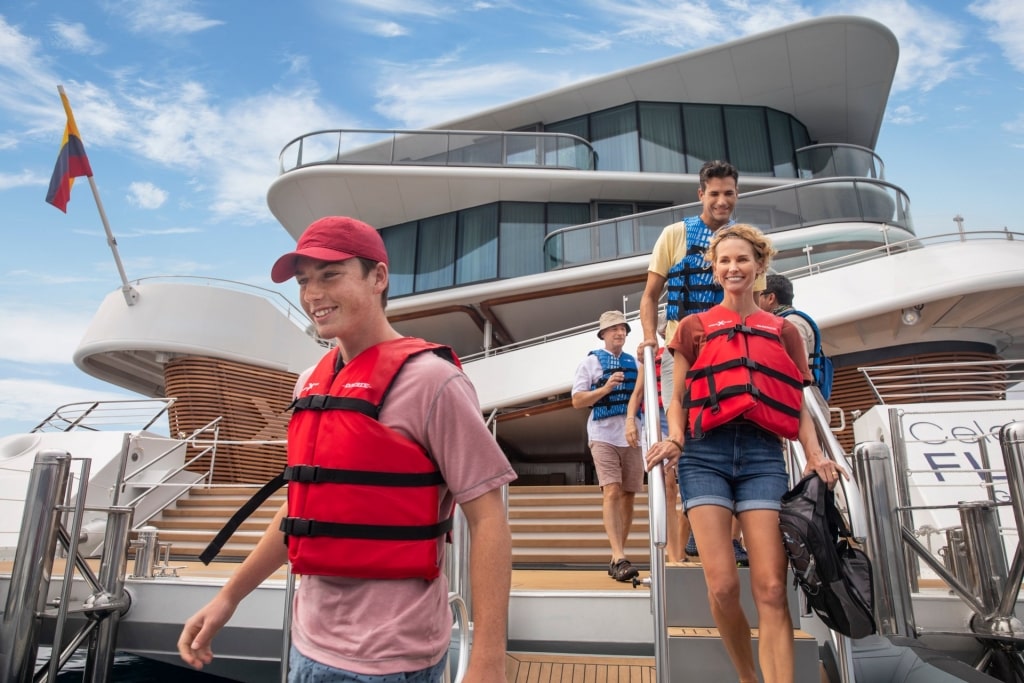
While small family groups might get away with a more collaborative effort, too many cooks in the kitchen can definitely complicate planning a large-scale family vacation, especially if there are a lot of strong personalities in your family. Streamline efforts by designating one or more appointed group leaders to help take charge by finalizing decisions, organizing details like itineraries and payment timelines, and managing group communications. Look for leaders who are especially good at doing research, communicating, and/or are savvy with negotiating as they most likely know how to plan a cruise that will go smoothly.
The leader(s) can also serve as a liaison with the cruise line, which can help with coordinating certain aspects of the logistics. You might also want to work with a travel agent, who can help manage some of the more cumbersome details of group travel planning. Which brings us to our next point . . .
Consult with a Travel Agent and/or the Cruise Line Directly
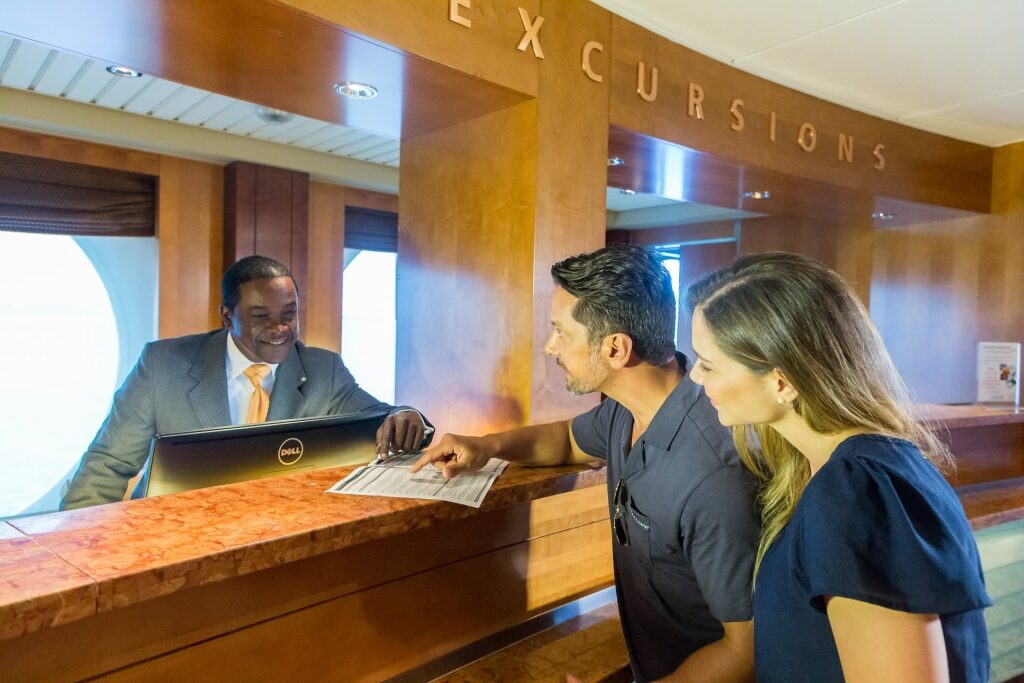
Shore Excursions Desk
You don’t have to wrangle this all on your own! Reach out to a trusted travel agent to help with some of the heavy lifting in terms of research, organization, and group logistics. A good agent can help you pinpoint the best cruise for family reunions, negotiate the most competitive rates, and score other amenities like shipboard credits. Plus, they can manage any necessary flight and pre- and post-cruise hotel bookings, too.
You can also liaise with the cruise line directly, who has staff that specializes in group cruises. The group planners are there to help take some of the pressure off of reunion organizers, so do sync up early on—they can manage group-oriented tasks like creating customized events, arranging shore excursions, and making dinner reservations. They can also serve as the point of contact for your family when it comes to responsibilities like collecting payments and resolving travel-related queries.
Keep Communication Flowing

La Sagrada Familia in Barcelona, Spain
The designated group leader(s) will want to set up an easy means of communication between participating family members so that the group can easily share thoughts, plans, and new information as it comes through. Be sure to collect email addresses and set up a private Facebook group or event page.
Conduct group polls so that you can collect preliminary preferences about desired sailing dates, embarkation ports, and itineraries. (Expert tip: Limit the choices to help maximize results.) The Facebook page would also be a good place to announce what families will be attending, what activities and excursions will be available to the group, and to outline other important details like payment deadlines.
Alternatively, you might use email addresses to send out a monthly e-newsletter documenting the most up-to-date information. Whichever means you use, expect guests to reach out with questions and/or feedback; be sure that somebody steps in to help manage those responses. Keep in mind, too, that there may be some older relatives who won’t be tech-savvy, so put somebody in charge of keeping them in the loop on all the details.

Ibiza, Spain
Before you board, distribute the group’s planned itinerary, as well as a list of everybody’s stateroom assignment, so that the family can easily sync up aboard the ship.
Determine a Family-Friendly Budget
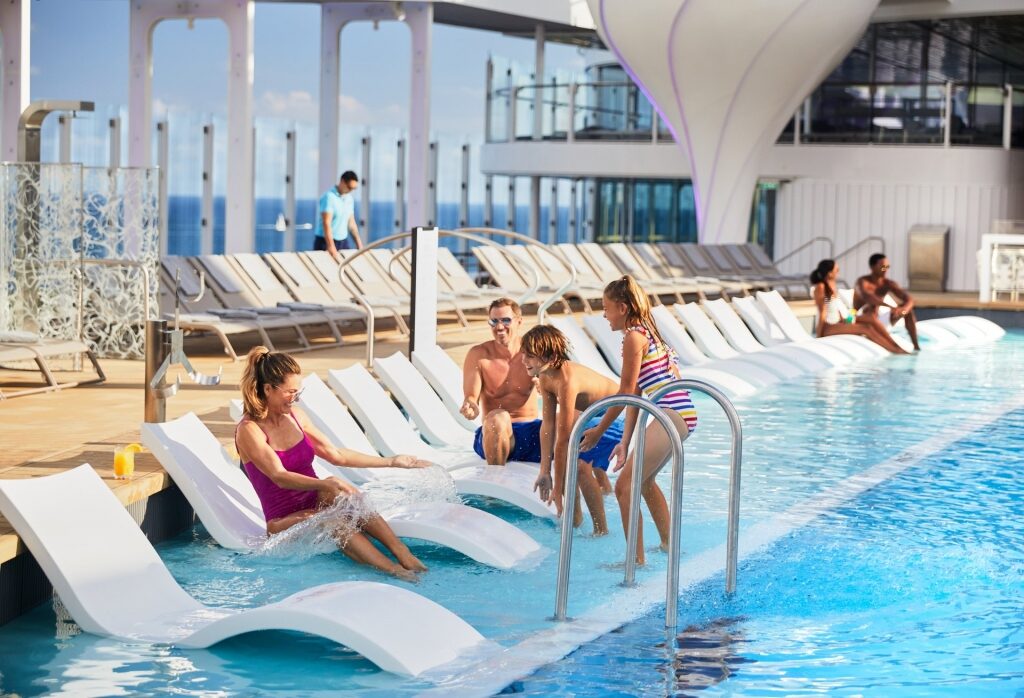
Pool on Celebrity Edge
As virtually all-inclusive vacations with accommodations, meals, port-to-port transportation, and most shipboard entertainment and activities bundled in, cruises do afford excellent value and are oftentimes more affordable alternatives to land-based vacations. (Bonus: Groups will typically qualify for special discounted rates, too.)
Chances are that most folks on the family tree come from different economic means, and cost will likely be a deciding factor for some family members’ ability to participate. Accordingly, you do want to get a clear picture of the associated costs presented to the group early on, so that sound decisions can be made.
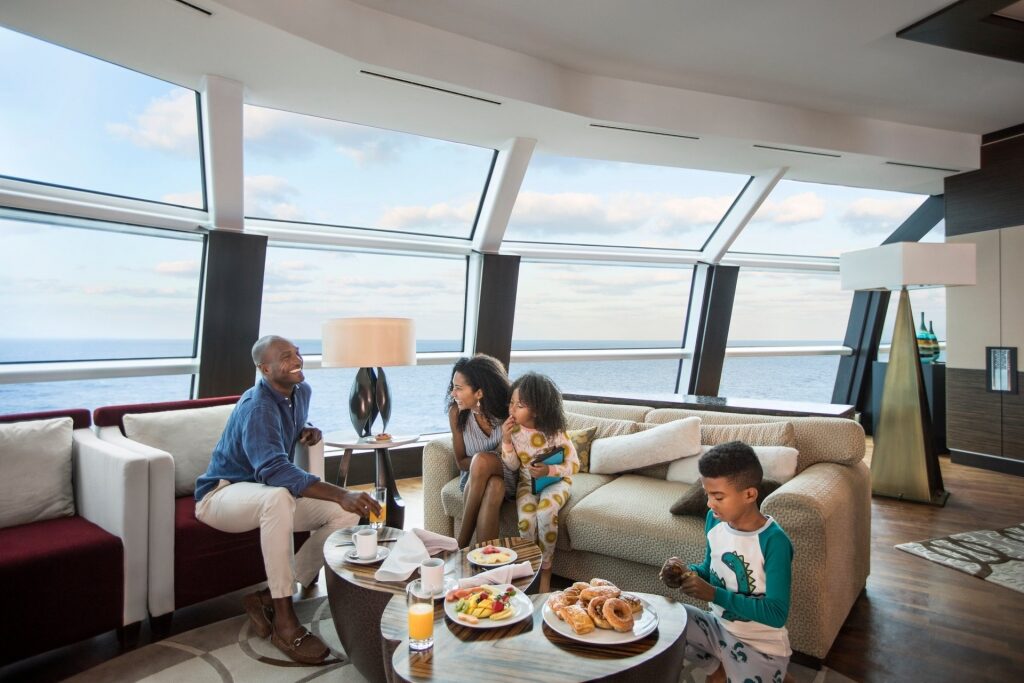
Celebrity Cruises Suite
Keep in mind that even on the same sailing, onboard accommodations come in a wide range of price points, so rates can ultimately be customized from interior staterooms to luxurious suites.
The beauty with cruising is that once guests have selected a stateroom that meets their budgets/needs (more on that below), they can count on having dealt with almost all of their major vacation expenses up front. And from there, they can control their own individual budgets for any “extras” that they may incur once the ship sets sail.
Pick an Embarkation Port

Colosseum in Rome, Italy
Remember that the further away the cruise departure port, the more expense (for airfare and perhaps pre- or post-cruise hotel stays), effort, and vacation time will be required of your family. To ensure a better rate of group participation, try picking a cruise embarkation port that’s set within driving distance—or just a quick flight away—from the majority of your family reunion guests.
Just remember, if guests do have to fly into a port, be sure that they arrive the night before the cruise. That way, they’ll avoid any stress related to potential day-of flight delays that could ultimately lead to them missing the cruise ship’s departure.
Read: Expert Tips for Pre-Cruise Bookings: Hotels, Flights, & More
Determine a Sailing Date and Duration
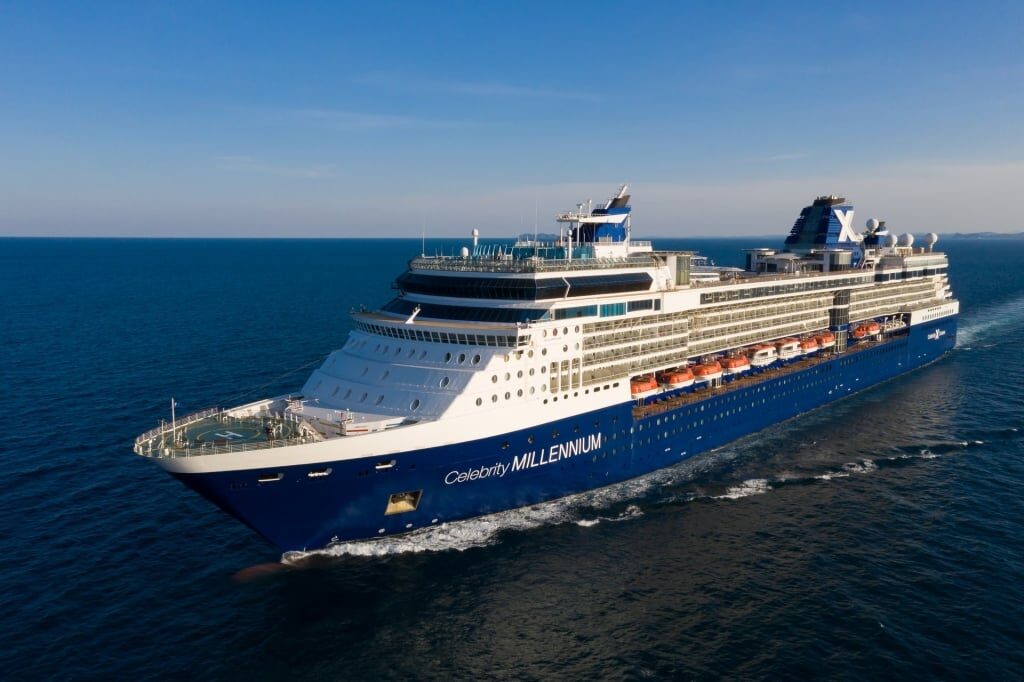
Celebrity Millennium
Poll your family for an idea of what sailing dates and types of cruises would work best for the majority of the group. If you’re traveling with kids, keep in mind that you’ll likely want to plan to sail during the summer or school holidays. Just know that those periods tend to fall within the cruising high season, so anticipate more demand.
From there, you’ll need to determine how long you can get away for. Cruises can vary in length from shorter 3- to 5-night sailings to weeklong—or longer—getaways. Let family members weigh in on the best time to go on a cruise based on their vacation and work schedules.
Chances are, you are likely to see more participation on a short cruise. On the other hand, if you’re gathering a group that rarely gets to see each other, you may want to extend the trip to really maximize the occasion.
Settle on an Itinerary

Mendenhall Glacier in Juneau, Alaska
Once you’ve honed in on a preferred embarkation port, as well as a general time frame and preferred duration for your sailing, you’ll likely have more limited itinerary inventory to sift through. In fact, the decision of a cruise destination may already be determined for you based on what’s left that fits your parameters.
If options do remain, however, consider what types of family cruise destinations might best suit the group. Are they beach lovers or culture vultures? Would they be happier island- or city-hopping? Ideally, you can find an option with a little bit of everything.
Some close-to-home locales that are sure crowd-pleasers include the Bahamas, Caribbean, Mexico, Alaska, and Bermuda.
Read: Bahamas vs. Caribbean: Which Should You Cruise to?

Blue Lagoon Island, Bahamas
Wherever you sail, do allow for lots of individual exploration in port, but be sure to plan at least a couple of fun group shore excursions so that your family can share some adventurous memories together, whether zip-lining, wine-tasting, water sports, or sightseeing is more your family vacation speed. Just be mindful of any family members with age restrictions or any physical disabilities to avoid exclusion when planning.
Finally, remember that if you are traveling internationally, everybody will need to have a valid passport secured well ahead of the cruise departure date.
Choose a Ship With Multigenerational Features

Lawn Club
Chances are, your family spans a wide range of ages, abilities, and personal interests, and you’ll want to choose a ship with the amenities and facilities to match. Bigger ships mean more bells and whistles, with loads of activities, entertainment, and drinking/dining establishments to ensure that there’s something to please everyone.
If you’re wondering what’s the difference between cruises vs resorts, today’s cruise ship is a floating resort—you’ll find swimming pools, fitness centers, spas, casinos, shops, libraries, bars, nightclubs, restaurants, entertainment venues, kids’ clubs, and more. Plus, there are plenty of daily activities like cooking demos, fitness classes, wine-tastings, and guest lectures.
Definitely don’t try to do everything together—let the group spread out and enjoy themselves as they like. But do plan on having at least a couple of times a day where you all come to reconnect at a set time and place, whether it’s over a meal or a shared activity. After all, the whole point of sailing together is that you get to spend time with each other.
Book Your Staterooms
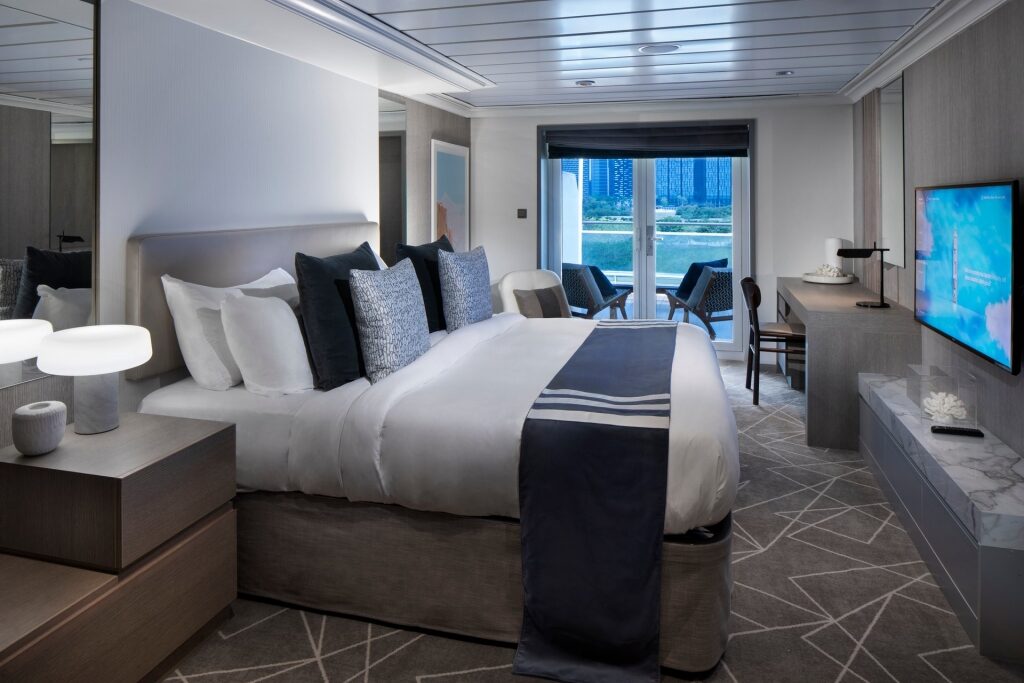
Celebrity Cruises Stateroom
Stateroom options vary widely on ships, which range in price accordingly. Some staterooms are interconnecting, while others can accommodate up to four guests, which are well suited for families traveling with children. Ideally, you’ll want to book a block of accommodations well in advance so that your group’s staterooms are clustered in the same area of the ship.

Celebrity Cruises Suite
Looking for the very best cruise for family reunions? Get assistance from Celebrity Cruises’ professional Group Planners today by visiting our website, and you’ll be well on your way to the family reunion cruise of your dreams!
